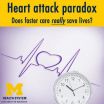(Press-News.org) David King, clinical lecturer in paediatrics at the University of Sheffield, says medical professionals and consumers need to be aware that such devices "have no proved use in safeguarding infants or detecting health problems, and they certainly have no role in preventing [sudden infant death syndrome] SIDS."
Wearable devices for infants are a growing industry worldwide. Devices that attach to a newborn baby to monitor its vital signs are marketed by several US companies at a cost of around $200 to $300 to give parents "peace of mind" about their baby's health.
One company's website says the device "alerts you if something appears wrong with your baby's heart rate or the amount of oxygen in his/her body." Another claims that its product allows parents to see their "baby's breathing patterns, in real-time."
None of these products requires Food and Drug Administration (FDA) approval, says King. They are not yet available in Europe, and it is unclear whether regulatory approval will be needed here, he adds.
Furthermore, no published data support any of these claims, and because the devices are being sold as consumer rather than medical devices such data are not required.
He recalls that in the 1980s and 1990s a plethora of similar products was developed and sold with the intention of reducing SIDS, but studies showed that such devices had no effect on the incidence of SIDS in healthy infants.
Although none of the makers of these new devices claim that they reduce the risk of SIDS, King argues that "parental fears about SIDS have driven the development of their products - and the themes in their marketing."
He acknowledges that some situations, such as preterm infants or infants who need oxygen, may justify home monitoring. But he says parents and other caregivers in these cases need to be trained in observation techniques, operation of the monitor, and infant cardiopulmonary resuscitation.
Ideally, manufacturers would be required to undertake observational studies or randomised trials to support any claims they make concerning the effectiveness of wearable devices in infants - even if they are categorised as consumer devices, suggests King.
Until this time, he says healthcare professionals "should not recommend these products to reduce parents' fears of SIDS but should instead focus on interventions that have been proved to work, such as encouraging parents to put infants on their back to sleep."
He also believes manufacturers "should place prominent disclaimers at the point of sale to emphasise that they are not medical devices and that no evidence shows that they reduce the risk of SIDS or have any other health benefits."
Are the manufacturers of these wearable devices for infants being completely transparent with their future customers, asks King? "If they are not, the risk is that the substantial amounts of money that parents pay for such devices might lull them into a false sense of security."
INFORMATION:
The authors say their findings are applicable to law enforcement work outside the US and support the view that stressful work related activities can "trigger" sudden cardiac death.
Law enforcement is a dangerous occupation. In 2011-2012, the fatality rate among US patrol officers was 15-16 per 100,000 full time workers - about 3-5 times the national average for private sector employees.
Some evidence suggests that cardiovascular disease is higher among police officers than the general population, but data about the impact of specific on duty activities ...
Observational studies have suggested that lower levels of vitamin D are associated with increased mortality, but whether low vitamin D concentrations are a cause of increased mortality or simply a consequence of poor health is thus unclear.
This is an important question, say the authors, as millions of people worldwide are regularly taking vitamin D supplements, presumably with the aim of preventing diseases and hopefully living longer.
Genetic variants have been reliably associated with circulating concentrations of vitamin D, a marker of vitamin D status. So a research ...
Boston, MA -- Police officers in the United States face roughly 30 to 70 times higher risk of sudden cardiac death (SCD) when they're involved in stressful situations--suspect restraints, altercations, or chases--than when they're involved in routine or non-emergency activities, according to a new study from Harvard School of Public Health (HSPH) and Cambridge Health Alliance (CHA). It is the first study to provide data that demonstrates the impact of stressful duties on on-duty SCD.
The researchers also found that physical training activities--which police don't consider ...
ANN ARBOR, Mich. -- A national effort to shave minutes off emergency heart attack treatment time has increased the chance that each patient will survive, a new study suggests. But yet the survival rate for all patients put together hasn't budged.
It seems like a paradox. But wait, say the authors of the new report: the paradox vanishes with more detailed analysis of exactly who has been getting this treatment.
Far more people are getting emergency angioplasty and stents for heart attacks now than before. That number now includes more people with more complicated health ...
Barcelona, Spain: A phase I trial of the first drug designed to inhibit the cancer-causing activity of a mutated enzyme known as isocitrate dehydrogenase (IDH) 1, which is involved in cell metabolism, has shown clinical activity in patients with advanced acute myeloid leukaemia (AML) with the IDH1 mutation.
Professor Daniel Pollyea, M.D. will tell the 26th EORTC-NCI-AACR [1] Symposium on Molecular Targets and Cancer Therapeutics in Barcelona, Spain, today (Wednesday) that early results from the phase 1 clinical trial of the drug AG-120, an oral, selective and potent inhibitor ...
Barcelona, Spain: Researchers have found that patients with an advanced form of kidney cancer, for which there is no standard treatment and a very poor prognosis, respond well to a combination of two existing anti-cancer drugs.
Dr Ramaprasad Srinivasan, head of the Molecular Cancer Therapeutics Section, Urologic Oncology Branch, of the National Cancer Institute in Maryland, USA, will tell the 26th EORTC-NCI-AACR [1] Symposium on Molecular Targets and Cancer Therapeutics in Barcelona, Spain, today (Wednesday) that the combination of bevacizumab and erlotinib produced ...
Barcelona, Spain: Results from a trial of the anti-cancer drug galeterone show that it is successful in lowering prostate-specific antigen (PSA) levels in men with a form of prostate cancer that is resistant to treatment with hormone therapy (castration-resistant prostate cancer or CRPC).
Associate professor Mary-Ellen Taplin, of the Dana-Farber Cancer Institute, Boston, USA, will tell the 26th EORTC-NCI-AACR [1] Symposium on Molecular Targets and Cancer Therapeutics in Barcelona, Spain, today (Wednesday) that galeterone was well tolerated by patients in the ARMOR2 trial, ...
VIDEO:
New research from the University of Copenhagen and Copenhagen University Hospital shows that low blood vitamin D levels increase mortality. The study included 96,000 Danes and was recently published in...
Click here for more information.
Vitamin D deficiency is generally associated with an increased risk of poor bone health. However, recent studies have shown that low levels of this important vitamin also involve an increased risk of other diseases and higher mortality ...
A brief coping strategies therapy which provides stress relief and emotional support for people caring for relatives with dementia can reduce depression and anxiety and improve wellbeing at no extra cost to standard care, new research published in The Lancet Psychiatry suggests.
The study led by Gill Livingston, Professor of Psychiatry of Older People at University College London in the UK, found that family caregivers receiving the START (STrAtegies for RelaTives) programme were seven times less likely to develop clinically significant depression than those given usual ...
A new diagnostic technique -- resulting from monitoring thousands of courtship calls from songbirds -- can be used to safely map the human brain during complex neurosurgery, according to research from Neuroscientists at NYU Langone Medical Center and elsewhere.
The mapping process, first tested in zebra finches, involves gently placing a miniature electrical cooling device at different locations on a small region of the songbirds' brains. This slows down processing of complex neural behaviors, such as a birdsong or human speech.
In a report prepared for the Society ...

